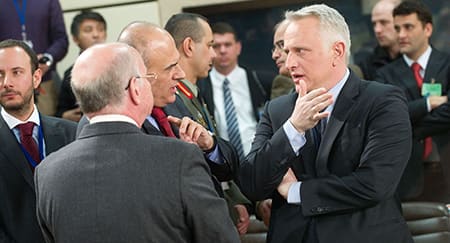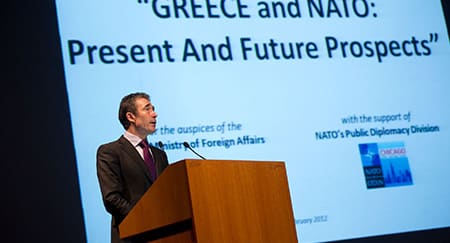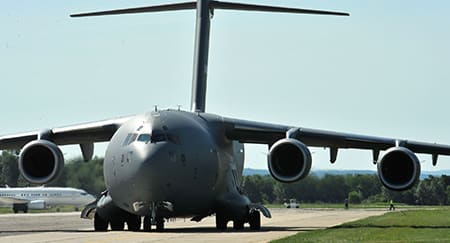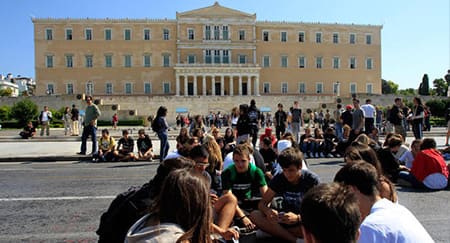The Alternate Minister of National Defence of Greece, Yiannis Ragoussis, tells NATO Review how important NATO is for Greece, as well as about his country’s active membership in NATO.
Greece is strategically located in the Southern region of the Alliance, in close vicinity to South Eastern Europe, the Eastern Mediterranean, the Middle East and North Africa. This broad region, as recently demonstrated, is characterised by geopolitical uncertainty and multiple and adverse strategic interests.
Membership to NATO is a fundamental pillar of Greece’s defence and security architecture together with its EU membership. Since its accession in 1952, Greece has contributed to Euro-Atlantic security and at the same time has been protected by the security umbrella the Alliance offers its members.
Since Greece is one of the oldest members of the Alliance, a broad consensus has been developed among its citizens about the unique and essential role of NATO in ensuring the common defence and security of its members. This consensus was built gradually despite times when Greeks were deeply concerned about the country’s relationship with NATO. Nowadays, both citizens and politicians, under the challenges of the modern security environment, recognize that NATO has ceased to be a mere military alliance and has been transformed into a political institution of broader scope. Furthermore, the country’s stability has been enhanced significantly. Being located in a strategically important region, Greece has gained a security dividend.
Greece’s participation proved beneficial for the security and stability of both Greece and its Allies in NATO. Its significant geostrategic location broadened the Alliance’s perimeter and the stability zone of Europe. It is worth mentioning that Greece actively contributes to all NATO operations, including the Libyan crisis when it participated in Operation Unified Protector from the very beginning, using its air and naval assets and providing its main bases in Crete and Peloponnesus to the Allied forces.
Integration into NATO has definitely had a positive impact in Greece as it has enhanced significantly the opportunities to redevelop defence capabilities and establish the necessary stability and security for development in the political, financial and civil sector. Greek accession broadened and reinforced the armed forces’ outreach opportunities to all aspects of defence reform including concept development, organizational improvements, enhancing operational capabilities, infrastructure, standardization and training.
As a NATO member Greece can take stock of other Allies’ experience and lessons learned. Taking advantage of this, Greece established an effective and efficient long term defence program which has resulted in developing credible and efficient armed forces. Integration into NATO allowed exploitation of innovative concepts and doctrines in both strategic and operational levels, the development of new capabilities and the adoption of new technology. It also enhanced command structure reorganization, and force structure reform, coupled with procurement of modern equipment, adequate infrastructure and an efficient operational training and evaluation system that allowed the development of the high operational standard of the armed forces. Above all it changed Greece’s military culture.
For many years Greece has been among the few Allies with defence expenditures much higher than the Allied benchmark
At the same time, and in compliance with the decisions taken during the Lisbon Summit, Greece supports the Alliance’s transformation. Given the challenges highlighted in the 2010 Strategic Concept, efforts remain highly focused on the development of more flexible, more capable and more cost-effective forces.
I would like to highlight at this point that for many years Greece has been among the few Allies with defence expenditures much higher than the Allied benchmark. In this respect I believe that the smart defence concept will help to rationalize Allied defence expenditures in a more profitable way for both Greece and the Alliance. It should also be stressed that both NATO and Greece are in the most critical stages of extensive reform. Under the conditions of a global financial crisis and strategic insecurity, and in parallel with NATO’s new Command Structure, Greece is implementing its own defence review.
Smart defence should stand as a long term political initative with significant practical outcomes and aimed at maximising efficiency, synergy and cost savings. Greece recognizes the benefits and the high value for money as a result of the cooperative efforts in a broad range of areas such as procurement, logistic management, maintenance, training, education, research and development.
It is widely accepted that none of the Allies can develop or provide the Alliance with the full range of capabilities needed to tackle new and emerging security challenges. Collective efforts, and development of multinational projects, are the only logical and promising answer. Greece is examining thoroughly the projects in which it will participate making sure that they will provide value for money and eventually contribute toward efforts to restore the country’s fiscal stability.
Taking into account the voluntary nature of nations’ engagement and the current fiscal realities, smart defence can be more successful, if we manage to match nations’ needs with the Alliance’s requirements. Furthermore, it is evident that each nation considers its participation in multinational projects by taking into account its own security concerns. Greece, for obvious reasons, is one of the countries that can benefit from such an initiative.
In concluding, I would like to underline that Greece’s current difficult financial situation actually contributes to the moral strengthening of its forces which are working harder than ever to maintain high standards and are making sure our people and our country is secure. Also, allow me to stress that Greece contributes positively in creating the appropriate structures and policies for regional security. Last but not least, enhancing security and stability collectively by forming Alliances has deep roots in Greek culture. Ιn ancient Greece, Athens took the initiative to form the first long lasting Alliance, the Delian League which has frequently been described as having many similarities with modern NATO. Greece, due to her geopolitical position and regional role, her active participation in all international organizations, her initiatives, her bilateral forms of cooperation and her explicit political will for peace, plays an important role in supporting the NATO of the 21st century.




